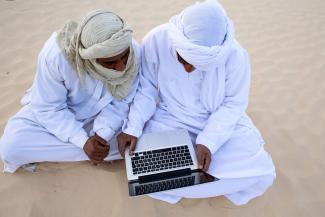Human civilisation
Why we need a UN charter
 Philippe Lissac/GODONG/Lineair
Philippe Lissac/GODONG/Lineair
António Guterres, the UN secretary general, keeps reiterating that we need deep transformations to prevent climate disaster as well as to fight poverty, reduce inequalities and stem rampant nationalism. He did so, for example, at the UN summits on the climate crisesand the Sustainable Development Goals (SDGs) in New York in September.
The UN leader has ample reason to be worried. A mountain of scientific publications points out the danger we are in. Probably the most impressive and comprehensive reports have been produced by the Intergovernmental Panel on Climate Change (IPCC). The scientific community has been making it absolutely clear that we need deep change if we are to achieve sustainability.
In retrospect, it is unfortunate that digitalisation was not mentioned in the major international policy agreements that heads of state and governments adopted in 2015. It obviously will have a bearing on achieving the UN’s 2030 Agenda, which includes the 17 SDGs, and the Paris Agreement on Climate Change. Artificial intelligence (AI), machine learning, virtual realities and related developments add up to a technological revolution which cannot be ignored.
Digital change will have impacts – some of them helpful, others detrimental – on every single SDG, ranging from poverty alleviation to resource efficiency, from governance to energy and mobility systems, from employment to transnational partnerships. Digital technology is speeding up fundamental societal and economic change (Sachs et al, 2019 ).
Eric Schmidt, the former Google chief executive, has said that AI-based systems may, within the next five to ten years, solve scientific puzzles worth a Nobel prize. Could they also be the game changer we need to facilitate transformation toward sustainability? Integrated well, the two megatrends of digitalisation and sustainability transformation could shape the 21st century in a positive way. They might create a model of human prosperity decoupled from resource consumption and emissions. At the same time, it might recouple economic growth and social progress.
The German Advisory Council on Global Change (Wissenschaftlicher Beirat Globale Umweltveränderungen – WBGU) recently published a flagship report with the title: “Towards our common digital future” (see Sabine Balk in D+C/E+Z e-Paper 2019/07, Monitor section). It shows two important, paradoxical things:
- Digital technologies have the potential to facilitate rapid transformations towards a green economy (by fostering decarbonisation in many sectors, multiplying resource and energy efficiency, and improving the surveillance and protection of ecosystems), but
- Ever-faster digitalisation has so far not brought about the sustainability U-turn we need. Instead, it is deepening and extending unsustainable growth patterns.
The UN Panel on Digital Cooperation (2019) and the science consortium “The World in 2050” (2019)have also come to these two conclusions in recent publications. There plainly is no automatism between digitalisation and sustainability transformations. The missing link is governance. Policymakers must act fast for humanity to rise to the climate challenge and achieve the SDGs and build the bridges between digital innovation and sustainability transformations.
Technological revolution
To be clear: sustainability transformations in the digital age are not simply about smart incentives triggering quick technological fixes. Much more is at stake. Our societies are undergoing change as dramatic as the change that was brought about by the printing press or the steam engine in earlier times. We are entering a new era of human civilisation. Among other things, paradigm shifts will affect the meanings of “human development” and “sustainability”.
We must take into account that digitalisation is not a blessing in itself. It is ambivalent:
- On the one hand, it is a potential enabler of a green economy and transnational networking with great scope for connecting people around the world and boosting a culture of global cooperation.
- On the other hand, digitalisation can exacerbate social divides, compound environmental risks and destabilise societies.
To get a grip on the dangers, we must therefore learn fast. The WBGU has identified several systemic risks in the digital age. They include the following:
- Digital technologies depend on specific resources and high energy consumption. Unless we decarbonise energy systems and build circular economies, digitally-driven growth will exceed planetary guardrails. Tipping points of the earth system (such as the melting of Greenland’s ice shield) will be reached.
- Driven by big data, artificial intelligence and machine learning will disrupt labour markets. Not only blue-collar workers will be made redundant, but so will high-skilled professionals including lawyers, accountants and engineers. No nation has a social protection system designed to cope with these challenges. Our economies and education systems are ill-prepared.
- Digital tools make it possible to trace everyone, while big-data analysis and social-scoring systems can be used to understand and manipulate individual and collective human behaviour. Democracy, freedom and human dignity are at risk where digital change serves authoritarian impulses.
- National science systems need to adapt too. The opportunities of the digital revolution are profound. Digital technologies are creating a new 21st century infrastructure for understanding the complexity of transformative change and responding accordingly. However, national science systems are struggling to adapt their infrastructures, priorities and processes to these new opportunities and challenges. Unless they interconnect to this emerging data-intensive world of science, they will be unable to progress, stagnating in isolation. Yet another knowledge gap is beginning to open up between the global north and the global south. We must stop this trend because this will not only hurt developing countries. It will hurt the entire international community.
- The combination of AI, big-data analysis, genome research and cognitive sciences is dangerous yet in another way: it opens the door to human beings becoming “enhanced” in physical, cognitive or psychological terms. No doubt, there will be attempts to “optimise” homo sapiens. The Anthropocene is the era of the planet being shaped by humans. In the Digital Anthropocene, humans are becoming able to transform themselves. We certainly need ethical guardrails, but we do not have them yet. This issue extends far beyond the horizon of the 2030 Agenda.
We must prepare
For several reasons, we are only insufficiently prepared to tackle the challenges listed above. Science as a whole is not yet exploiting the tools of the digital revolution. Sustainability science and the research on digital innovations are not linked to one another sufficiently. The knowledge of what impact digital dynamics have on public agencies (including, of course, multilateral organisations like the UN) is still underdeveloped. How sustainability and digital transformations are linked has not been studied sufficiently either. We lack public discourse on what a human-centred, sustainable digital age would look like, and such discourse must not only involve policymakers, but also businesses, civil society and academia.
No doubt, action is needed fast. We must grasp the opportunities, gearing powerful technological innovations to sustainability.
Therefore, the WBGU has joined forces with other science organisations including the International Science Council, Future Earth, the UN University as well as several partners from Asia and Africa. At the UN events in New York in September, we launched a draft for a UN charter for a sustainable digital age. It is called “Our Common Digital Future” and can serve as the basis for global debate, involving scientists, decisionmakers, community activists and citizens all over the world. Such debate must then lead to action.
The global charter must contain three elements:
- Digitalisation should be designed in ways that serve the achievement of the SDGs and the Paris Agreement.
- Beyond that, systemic risks need to be avoided.
- Every nation must prepare for a sustainable digital age, and that implies reforms in education sectors, intensive research on relevant matters and adopting ethical guardrails.
The draft charter has been published on multiple websites. It is open for comment and discussion. It builds on the Human Rights Declarations, the 2030 Agenda and the Paris Climate Agreement. Given, moreover, that digitalisation and sustainability have such overarching relevance, it would make sense to hold a world summit on “Our Common Digital Future” in 2022 – 30 years after the Earth Summit in Rio de Janeiro.
Heide Hackmann is the chief executive officer of the International Science Council.
ceo@council.science
Dirk Messner co-chairs the German Advisory Council on Global Change (Wissenschaftlicher Beirat Globale Umweltveränderungen – WBGU) and is a director at the United Nations University. messner@ehs.unu.edu
References
IPCC, 2018: Global warming of 1,5 C. Geneva.
IPCC, 2019: The ocean and the cryosphere in a changing climate. Geneva.
Sachs, J., Schmidt-Traub, G., Mazzucato, M., Messner, D., Nakicenovic, N., Rockström, J., 2019: Six transformations to achieve the Sustainable Development Goals. Nature Sustainability, Vol. 2, September, 805-814.
The World in 2050, 2019: The digital revolution. Vienna, IIASA.
WBGU, 2019: Towards our common digital future. Berlin, WBGU.
UN High-level Panel on Digital Cooperation, 2019: The age of digital interdependencies. New York, UN.


